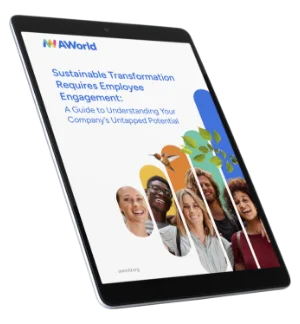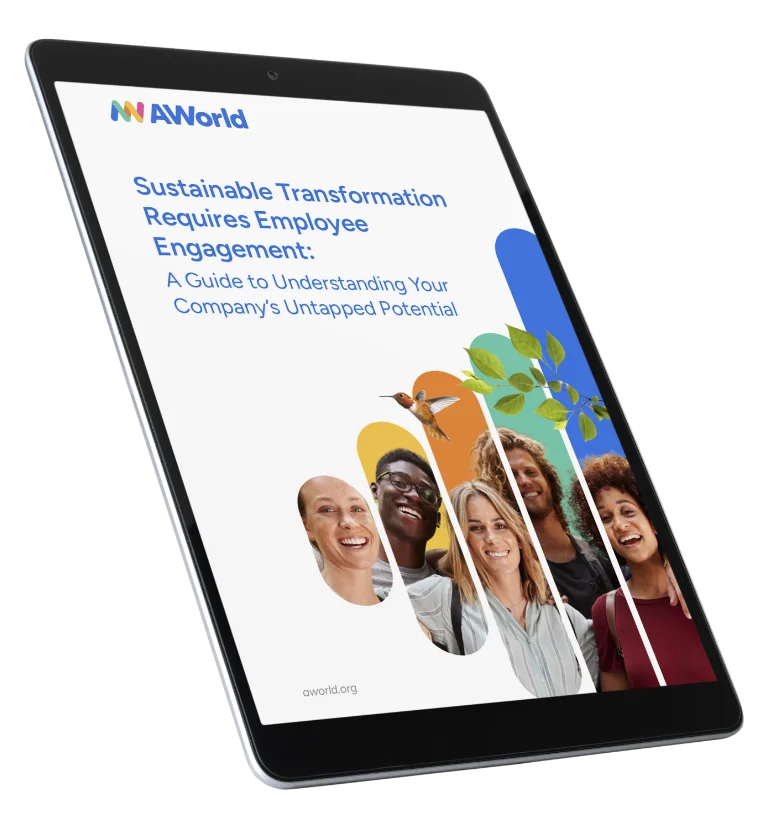In an era marked by increasing environmental concerns, social responsibility and corporate sustainability, organizations worldwide are recognizing the critical role they play in shaping a better future.
Environmental, Social and Governance (ESG) goals have emerged as a powerful framework for guiding businesses towards sustainable practices and responsible decision-making. While much attention has been focused on the role of corporations in achieving these objectives, the significance of engaging and empowering employees in this process cannot be overstated.
Join us as we embark on a journey to explore the significance of ESG goals for employees and discover how organizations can create a sustainable future by harnessing the collective power of their workforce.
What are ESG goals?
ESG stands for Environmental, Social and Governance. It refers to a set of criteria or factors used to assess a company’s performance and impact in these three areas. ESG is a framework that evaluates how companies manage environmental risks and opportunities, address social issues and responsibilities and uphold strong governance practices. It considers a wide range of sustainability and ethical considerations that go beyond financial metrics, providing a more comprehensive understanding of a company’s long-term value and impact on various stakeholders, including investors, employees, customers and the broader society.
Why are ESG goals important for employees?
ESG factors have significant implications for a company’s employees, influencing various aspects of their work experience and overall well-being. Here are specific ways in which ESG factors impact employees:
- Environmental: ESG’s environmental dimension affects employees by promoting a sustainable and eco-friendly workplace. It entails implementing practices such as energy efficiency, waste reduction and responsible resource management. Employees benefit from a healthier work environment, reduced exposure to harmful substances and the satisfaction of working for a company that prioritizes environmental stewardship.
- Social: The social aspect of ESG directly impacts employees by fostering a supportive and inclusive workplace culture. Companies that prioritize social responsibility focus on diversity and inclusion, fair treatment and employee well-being. This includes offering equal opportunities, maintaining work-life balance, promoting health and wellness programs and ensuring a safe and respectful working environment. Employees feel valued, respected and empowered within an organization that emphasizes social factors.
- Governance: ESG’s governance element influences employees by promoting strong leadership, transparency and ethical business practices. Companies with robust governance practices ensure employee rights, fair compensation and opportunities for professional growth. Effective governance structures encourage open communication, employee engagement and participation in decision-making processes. Employees gain trust and confidence in their organization’s leadership and have a voice in shaping its direction.
Moreover, the report Beyond compliance: Consumers and employees want business to do more on ESG reveals a captivating finding: a remarkable 86% of employees actively seek out and favour companies that align with their concerns regarding critical environmental, social and governance issues. This powerful alignment of values brings to light the pivotal role of ESG factors in not only attracting but retaining top talent in today’s competitive business landscape.
The inextricable link between employee engagement and ESG goals
Employee engagement plays a pivotal role in the attainment of corporate ESG goals, constituting a significant 80% of the overall progress towards these objectives. This underscores the immense value that employees bring to the table when it comes to driving ESG outcomes.
When employees are actively engaged and invested in their company’s ESG initiatives, they become powerful catalysts for positive change. Their commitment and enthusiasm can influence the successful implementation of environmental, social and governance practices throughout the organization. By embracing ESG principles and integrating them into their daily work, employees contribute to the overall sustainability and responsible business practices of the company.
Moreover, employee engagement in ESG initiatives yields a wide range of benefits. It enhances employee satisfaction and fosters a sense of loyalty, effectively attracting and retaining top-tier talent that seeks purpose-driven work environments. Engaged employees are more inclined to collaborate, innovate and offer valuable insights to enhance ESG strategies. Their active involvement also bolsters the company’s reputation and establishes trust among stakeholders, including customers, investors and the broader community.
However, achieving ESG goals necessitates more than mere good intentions. Organizations must employ effective methods and strategies to empower and educate their workforce, fostering a culture of sustainability and responsibility that permeates every facet of the business. From implementing comprehensive training programs to facilitating transparent communication channels, companies need to equip employees with the requisite knowledge, tools and support to actively contribute to their ESG initiatives.
How to set ESG goals?
Establishing ESG goals for your organization involves a deliberate and strategic process. Here are four essential steps to guide you in this endeavour:
- Assess your starting point
Before embarking on setting targets, it is crucial to gain a comprehensive understanding of your organization’s current operations. Conduct baseline assessments to evaluate your performance across key ESG criteria. This assessment will serve as a reference point for measuring progress towards your sustainability objectives. Collect and analyse relevant data, such as energy consumption, carbon footprint measurements, waste generation and water usage.
- Set SMART goals
To ensure your ESG goals are effective and actionable, employ the SMART framework. SMART stands for specific, measurable, attainable, relevant and time-based. By breaking down broader objectives into SMART goals, you can establish clear and feasible targets within a defined timeframe.
- Monitor and measure progress
Regularly monitoring and evaluating your progress towards ESG goals is vital. Establish key performance indicators (KPIs) that provide both qualitative and quantitative insights into goal attainment. This data-driven approach enables you to track your achievements and identify areas for improvement. Remain accountable to stakeholders and relevant regulators and implement robust ESG reporting practices to demonstrate transparency and accountability.
- Foster cross-team collaboration
Once you have defined your ESG goals and established an achievable framework, it is essential to promote internal alignment and collaboration. Share your goals with relevant teams and departments within your organization, encouraging a collective effort towards their realization. Transparency plays a crucial role in enhancing accountability and credibility throughout your journey. Clearly communicate the rationale behind your chosen ESG goals, disclose the processes and KPIs employed for tracking progress and highlight how they contribute to your organization’s overall mission and vision.
5 strategies for harnessing employees’ potential in achieving ESG goals
Engaging employees in the achievement of Environmental, Social and Governance (ESG) goals is crucial for the overall success of an organization’s sustainability initiatives. Here are some strategies to effectively engage employees in the pursuit of ESG goals:
- Communicate the purpose: Clearly articulate the organization’s ESG goals, the reasons behind them and how they align with the company’s values and long-term vision. Help employees understand the significance of their contributions and how they can make a positive impact on the environment, society and governance practices.
- Foster a culture of sustainability: Create a culture that promotes sustainability and responsible business practices. Ensure that ESG considerations are integrated into the organization’s values, policies and decision-making processes. Encourage employees to adopt sustainable behaviour’s both at work and in their personal lives.
- Provide education and training: Conduct regular training sessions and workshops to enhance employees’ understanding of ESG concepts, their relevance to the organization and the role each individual play in achieving ESG goals. Offer opportunities for employees to develop new skills and expertise related to sustainability.
- Set clear targets and Key Performance Indicators (KPIs): Establish measurable targets and KPIs that align with the organization’s ESG goals. Make these goals transparent and track progress regularly. Engage employees by involving them in the goal-setting process and allowing them to contribute ideas and suggestions.
- Recognize and reward efforts: Acknowledge and reward employees who actively contribute to ESG initiatives. Implement recognition programs that highlight outstanding achievements in sustainability. Celebrate milestones and share success stories to inspire others and create a sense of collective accomplishment.
AWorld: the sustainable platform for the achievement of ESG goals
AWorld stands as the premier platform selected by the United Nations for the Act Now campaign, a visionary initiative aimed at mobilizing individual action against the pressing challenge of Climate Change. Boasting a comprehensive array of cutting-edge features, AWorld emerges as an invaluable asset for businesses seeking to actively involve their employees in the pursuit of their ESG goals. But how does it work? Let’s find out:
- Empowering employees to comprehend the magnitude of their ecological impact.
AWorld achieves this by utilizing an advanced footprint calculator. By carefully analyzing responses to inquiries about personal habits and lifestyle choices, this sophisticated tool swiftly generates a precise estimation of individual CO2 emissions. - Educating employees on sustainability matters.
AWorld employs captivating storytelling techniques and informative resources to immerse employees in the realm of sustainable development. Accompanied by quizzes designed to strengthen their understanding and engagement, this educational approach enhances their knowledge of sustainability issues. - Guiding employees toward the adoption of environmentally conscious habits and lifestyles.
AWorld offers a wealth of behavioural tips and recommendations, enabling individuals to make tangible contributions to environmental preservation and conservation in their daily lives. - Monitoring and showcasing employees’ achievements in their sustainability endeavours.
Through insightful tracking mechanisms, AWorld provides individuals with visibility into their contributions, including water, energy, waste and CO2 savings. This transparent feedback reinforces personal accountability and fosters ongoing dedication to sustainable practices. - Employing gamification techniques to reward and motivate employees.
AWorld implements a gamified approach, wherein individuals accumulate valuable experience points as they complete positive actions or achieve educational milestones. This approach fosters engagement, instils a sense of achievement and inspires continued commitment to sustainable initiatives. - Cultivating a friendly and competitive atmosphere among employees.
AWorld facilitates the formation of teams and the launch of challenges, promoting collaboration, healthy competition and mutual support in the pursuit of sustainability goals. - Providing comprehensive reports.
AWorld enables companies to review achieved results and objectives. These reports can be shared with employees, enhancing transparency and celebrating collective accomplishments.
Take a proactive leap towards achieving your organization’s ESG goals and igniting the passion of your employees in the exhilarating journey towards sustainability. Unlock the full potential of AWorld’s remarkable functionalities and embark on a collective mission to shape a brighter, greener future. Let’s harness the power of individual action and join hands in creating a sustainable world that leaves a legacy for generations to come. Together, we can make a difference and pave the way for a more vibrant and sustainable future for all.






